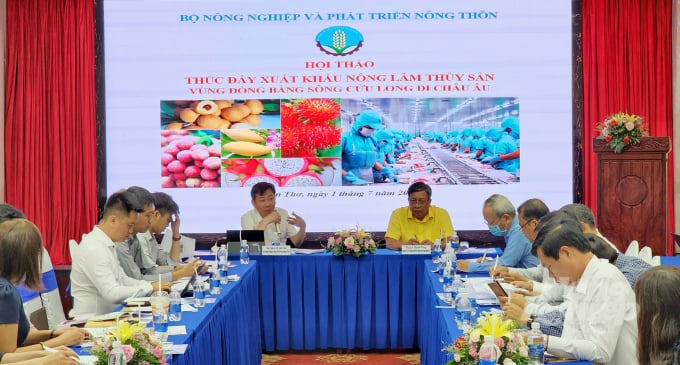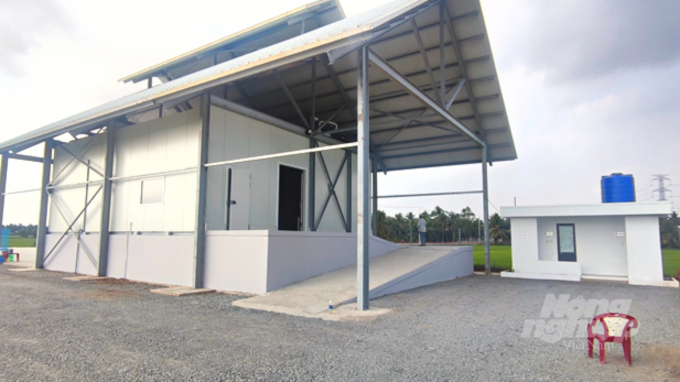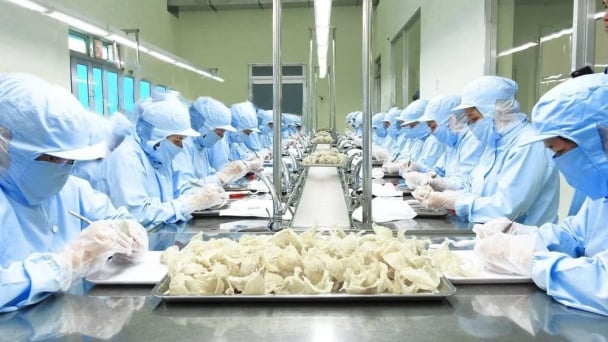May 16, 2025 | 09:08 GMT +7
May 16, 2025 | 09:08 GMT +7
Hotline: 0913.378.918
May 16, 2025 | 09:08 GMT +7
Hotline: 0913.378.918
The European Union (EU) is a large and high value import market for agro-forestry-fishery products (AFFP). In 2020, it imported the main AFFP worth nearly USD300 billion. This market is also one of the four largest AFFP export markets of Vietnam after the US, China and ASEAN. The agricultural sector has determined that the EU is the first and most important pilot market to build a brand name for Vietnam's agricultural products, improve its reputation globally, and follow the established agricultural strategic orientation as being transparent, responsible and sustainable.

A workshop is held to consult for the project "Promoting agro-forestry and fishery exports to the EU until 2030". Photo: Kim Anh.
In particular, he EU-Vietnam Free Trade Agreement (EVFTA) that took effect on August 1, 2020, has created a great opportunity for Vietnam's AFFP exports to expand the market and diversify the supply of raw materials by cutting tariffs, especially for processed products. Many opportunities are ahead, but currently, Vietnam's AFF export turnover to the EU takes a small proportion. Imports from Vietnam account for less than 2% of the EU's total annual AFFP imports.
At a consultation workshop on the project "Promoting agro-forestry and fishery exports to the EU until 2030" was held on July 1 by the Department of International Cooperation under MARD in Can Tho City, some representatives from local Departments of Agriculture and Rural Development (DARD) in the Mekong Delta regions and enterprises in the field of agricultural and aquatic product export raised concerns about the cold storage system in the region saying the preservation technology has not met exporters' requirements. The current status of cold storages in the Mekong Delta and the Southeast can only meet 30% of the market demand. In which, the Mekong Delta only has 6 cold storages with small-scale, and undeveloped services. This becomes a "barrier" for AFFP in the region to access the EU, especially for vegetables and seafood products.
Mr. Nguyen Do Anh Tuan, Director of the Department of International Cooperation, said that vegetables, fruits and seafood will be the priority and focusing items to develop in the project, because they can regularly satisfy large orders, meeting the quality standards. Preservation technology in cold storages is a key issue for these products to have higher added value.
Chairman of the Board of Directors and General Director of Vina T&T Group, Mr. Nguyen Dinh Tung said that the biggest advantage for export to EU market is the input. All Vietnamese vegetables and fruits enter this market without negotiations. However, the technical barrier and frequency of control are extremely strict. He gave an evidence that for new businesses exporting to the EU, the first 10-20 consignments will be 100% inspected.
According to Mr. Tung, preservation technology is a matter of survival for enterprises when exporting to the EU. Because of the geographical distance, shipping goods will take a long time. Thus, Vietnamese products that want to ensure quality when "docking" in this market require high and intelligent preservation technology.
Mr. Nguyen Tan Nhon, Deputy Director of the Can Tho City's DARD also identified that preservation technology is the biggest bottleneck of AFFP exports. Especially with fruit items.
"Advanced technologies and new techniques are almost unreachable in the region," emphasized Nhon.A representative of Tra Vinh province said that the project on promoting AFFP exports to the EU market by 2030 also needs to focus on building a chain of smart cold storage for the delta region to soon complete the logistic system there.

A model of smart cold storage tested in Tra Vinh province. Photo: Kim Anh.
A model of smart cold storage sponsored by the Government of Belgium was inaugurated in Tra Vinh province in March. This is the first project implemented in the province with a total investment of more than USD1 million. It was built on a total area of about 1,000 square meters.
According to the Institute of Agricultural Planning and Design, MARD, with the project to develop smart cold storage and logistics chain in the Mekong Delta and in the southeastern regions, the agricultural industry has oriented towards a long-term goal after 2030 to transform 50% of the Mekong Delta fruit exports from the Chinese market to Europe and the Middle East.
A research team of the institute recently conducted surveys on 14 potential locations in 6 provinces and cities in the Mekong Delta to build smart cold storages. In the immediate future, it will propose to the EU to consider funding the construction of 5 smart cold storages in Can Tho City, Dong Thap, Hau Giang, Tra Vinh and Vinh Long provinces.
Smart cold storage locations are located in concentrated fruit production areas in the Mekong Delta, ensuring agricultural products to be preserved immediately after harvest, and shortening the transportation distance. At the same time, traffic near the port is also prioritized to facilitate the transportation of refrigerated containers by road, inland waterway and seaport. The MARD will research and develop more 100-200 smart cold storages in the Mekong Delta provinces to meet the demand IN storing vegetables and fruits for export to Europe and the Middle East according to the volume forecast by 2030.
Translated by Linh Nguyen

(VAN) Japan's efforts to lower the price of rice through the release of its stockpile may finally be making some progress, albeit at a snail's pace.

(VAN) U.S. tariffs are not only a 'shock', but also an opportunity for Vietnamese businesses to renew their mindset toward comprehensive development.

(VAN) As Bac Giang lychee enters the harvest season, Minister Do Duc Duy expects that the fruit will contribute greatly to agricultural exports due to standardized production and deep processing.

(VAN) Consumers have shown a preference for free-range eggs, but those farming systems are more vulnerable to biosecurity risks like bird flu.
/2025/05/09/5701-1-184335_301.jpg)
(VAN) Vietnam’s eel exports nearly doubled thanks to a mud-free farming model, opening up new prospects while still facing numerous barriers related to international standards.

(VAN) Minister Do Duc Duy warned that if production is not professionalized and supply chains are not transparent, the U.S. market could become a growth bottleneck.

(VAN) Delegating surveillance responsibilities to local authorities is a cost-saving and efficiency-boosting measure that removes a key bottleneck for enterprises, according to Director General Duong Tat Thang.